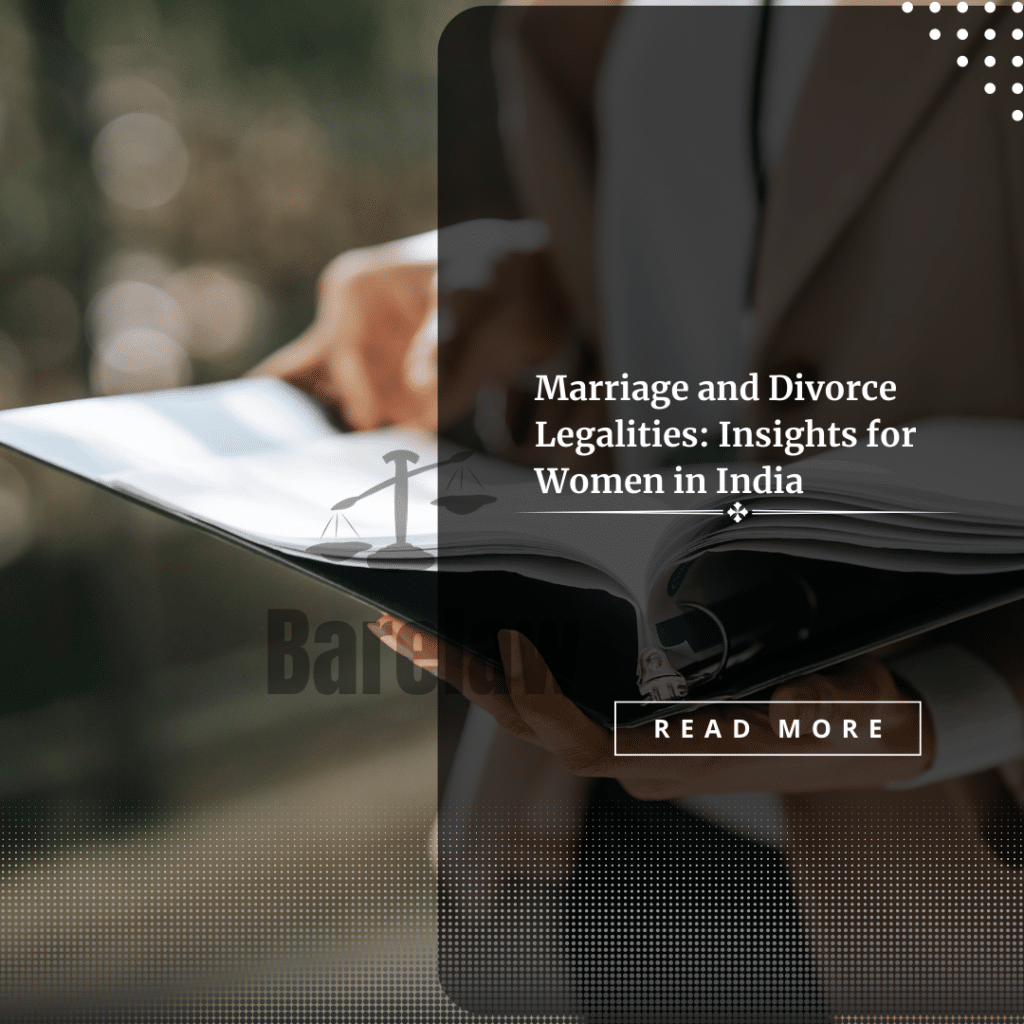
Table of Contents
Marriage and Divorce Legalities: Insights for Women in India
Marriage and Divorce Legalities: Insights for Women in India
Marriage is a big milestone in one’s life and it is important to know the legal aspects around it, especially for women. In India, where marriage and divorce have certain legal implications, women should know their rights and duties well. This article discusses various legal issues related to marriage like registration, prenuptial agreements and divorce proceedings highlighting some of these areas from the point of view of women.
Marriage Registration:
In India, marriage registration is mandatory by law because it gives legality to the relationship and also opens doors for many entitlements as well as benefits. Each partner should register their union under relevant laws which may differ depending on religious or personal choices. A certified copy of registered marriages acts as an essential document that can be used as evidence frequently when applying for passports among other things or claiming social services.
Prenuptial Agreements:
Prenuptial agreements are becoming more common in India although they are not widely recognized compared to western countries. These agreements state how assets will be shared out or divided between spouses if there occurs a divorce. For women, a good pre-nup can provide financial security besides clarifying property rights too. Nevertheless remember all prenups must follow specific rules else they become unenforceable before courts.
Rights and Responsibilities:
Both partners have rights and responsibilities towards each other within the context of matrimony but it is important that ladies comprehend what these entail vis-à-vis their male counterparts’ entitlements such as:
- Equality: Indian Constitution guarantees equal right for both genders hence no sex should be discriminated against during any stage including this phase called wedlock.
- Maintenance: If a woman separates from her husband legally through divorce then she has full entitlements over spousal support (maintenance). This ensures that even after the marriage ends all financial needs of wife are taken care off by ex-husband until she remarries or dies whichever comes first.
- Property Rights: Wives also own their spouses’ properties and can claim them as well thus it is necessary to know about property ownership especially joint assets which will safeguard one’s interest in case of divorce.
Divorce Proceedings:
Divorces may be messy emotionally and legally too; there are various grounds upon which a couple can seek for separation depending on religion followed by personal laws governing such matters within India. Common reasons for seeking dissolution include cruelty, desertion, adultery or mutual consent among others where women should be aware of the following:
- Mutual Consent Divorce: This is the most peaceful method to terminate wedlock where both parties agree on everything outside court including alimony payments, child custody and sharing of properties amongst themselves without any intervention from third parties like judges etcetera.
- Contested Divorce: In instances when one spouse wants out but other does not then legal battles may ensue leading into contested divorces hence husbands need attorneys too. There will be need for lawyers to represent both sides so that each person’s rights can be protected adequately throughout litigation process until final verdict is given by relevant authority concerned with family law matters.
Child Custody and Support:
When parents go through separation their children often become victims caught up in middle of tug-of-war between them thus making decisions regarding who gets custody become very difficult at times since each parent claims better ability take care off kid than other. Courts usually base judgment on what would serve best interest of child therefore mothers need know how this affects them during divorce settlements.
Women have certain privileges with regard to raising kids after getting divorced; these include right ask for children live under her care as well ensuring their welfare remains top priority.
Legal Assistance and Mediation:
Dealing with marriage-related legal troubles can be intricate. With this, ladies should think of hiring lawyers to have knowledge about their rights, what they can do and expect. Mediation may also serve as an effective strategy for resolving conflicts because it offers individuals a chance to come up with agreements that satisfy all parties involved without going to court.
Support Networks and Resources:
When women face legal challenges connected with marriage or divorce, they need to seek support from different sources. Legal aid clinics, non-governmental organizations (NGOs) and women’s rights groups give out information on legal matters as well as guiding people through such processes where necessary. Joining a support network is important because it provides both emotional and practical help during difficult times.
Changing Norms and Empowerment:
Currently, there is an increasing number of women who are aware of their rights and therefore challenge unfair practices against them following changes in societal expectations. The law too has been changing so as to accommodate these new realities but this alone cannot work unless females take the initiative of finding out what their entitlements are legally speaking then asserting those whenever required.
Conclusion:
Marriage and divorce are complex events in law that significantly affect women’s lives. For this reason, it is important for women to understand the legalities involving registration; prenuptial agreements; divorce proceedings among others including child custody issues so as not only protect themselves but also make informed choices regarding such matters which will influence their future forever. Women should therefore stay knowledgeable about their rights throughout these processes by seeking appropriate professional advice when necessary thereby enabling them go through with confidence knowing that all along their welfare was being taken care of.





